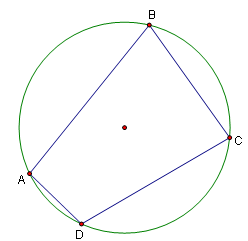Difference between revisions of "Cyclic quadrilateral"
(→Intermediate/Advanced) |
(→Problems) |
||
| Line 23: | Line 23: | ||
== Problems == | == Problems == | ||
| + | |||
| + | === Intermediate/Advanced === | ||
| + | * [[1991 AIME Problems/Problem 12]] | ||
| + | * [[2001 AIME I Problems/Problem 13]] | ||
| + | * [[2000 AIME I Problems/Problem 14]] | ||
| + | * [[1997 AIME Problems/Problem 15]] | ||
| + | |||
| + | [[Category:Definition]] | ||
| + | |||
| + | [[Category:Geometry]] | ||
| + | |||
| + | {{stub}} | ||
Latest revision as of 18:41, 3 January 2025
A cyclic quadrilateral is a quadrilateral that can be inscribed in a circle. While all triangles are cyclic, the same is not true of quadrilaterals. They have a number of interesting properties.

Properties
In a quadrilateral ![]() :
:
 This property is both sufficient and necessary (Sufficient & necessary = if and only if), and is often used to show that a quadrilateral is cyclic.
This property is both sufficient and necessary (Sufficient & necessary = if and only if), and is often used to show that a quadrilateral is cyclic.



- All four perpendicular bisectors are concurrent. The converse is also true. This intersection is the circumcenter of the quadrilateral.
- Any two opposite sites of the quadrilateral are antiparallel with respect to the other two opposite sites.
Applicable Theorems/Formulae
The following theorems and formulae apply to cyclic quadrilaterals:
Problems
Intermediate/Advanced
- 1991 AIME Problems/Problem 12
- 2001 AIME I Problems/Problem 13
- 2000 AIME I Problems/Problem 14
- 1997 AIME Problems/Problem 15
This article is a stub. Help us out by expanding it.









